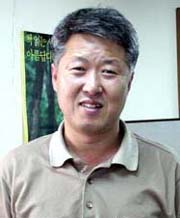Posted on : Aug.2,2006 13:02 KST
Kwak Byoung Chan, editorial writer
The Tet Offensive, which took place January 31, 1968, destroyed any remaining illusions the American public had about any easy victory in Vietnam. The U.S. embassy in Saigon was in enemy hands for 24 hours. The anti-war movement became stronger still. Young people felt despair at all the war, racism, and oppression on the part of public authority, as well as at the dehumanization of civilization. Some chose to participate in the movement in resistance to the oppression, while others engaged in morally deviant behavior. These two dramatically converged at the Woodstock Music and Art Festival in 1969.
The theme was "Three Days of Peace and Music." It began on August 15, and despite heavy rains, 450,000 people showed up to cry out for peace and sing of love and freedom. Jimi Hendrix mocked the American national anthem. Janis Joplin, The Who, Jefferson Airplane, and many others agitated for resistance with a strong beat. "Queen of folk" Joan Baez and Indian music legend Ravi Shankar participated as well, but Woodstock was overwhelmingly given over to rock.
Rock festivals caught on after Woodstock. But as the spirit of resistance weakened, festivals became more psychedelic than anything else. Rock was overcome by material wealth and moral deviation and rock artists and fans frequently turned to drugs. Thirty years later, they held an event they hoped would be a revival of the spirit of Woodstock, but it turned into a scene of violence and sexual harassment.
The Incheon Pentaport Rock Festival was recently held in Incheon's Songdo neighborhood. Some 30,000 people showed up, despite the heavy rain and played in the mud for three days and two nights. It started off right, but you hear people say they missed the spirit of resistance, creativity, community, and peace. When rock loses that spirit, it becomes noise, and rock festivals become open air street-market stalls. Woodstock 1999 was held in nearby Bethel because authorities in Woodstock, N.Y. would not permit it to take place where it had the first time.






